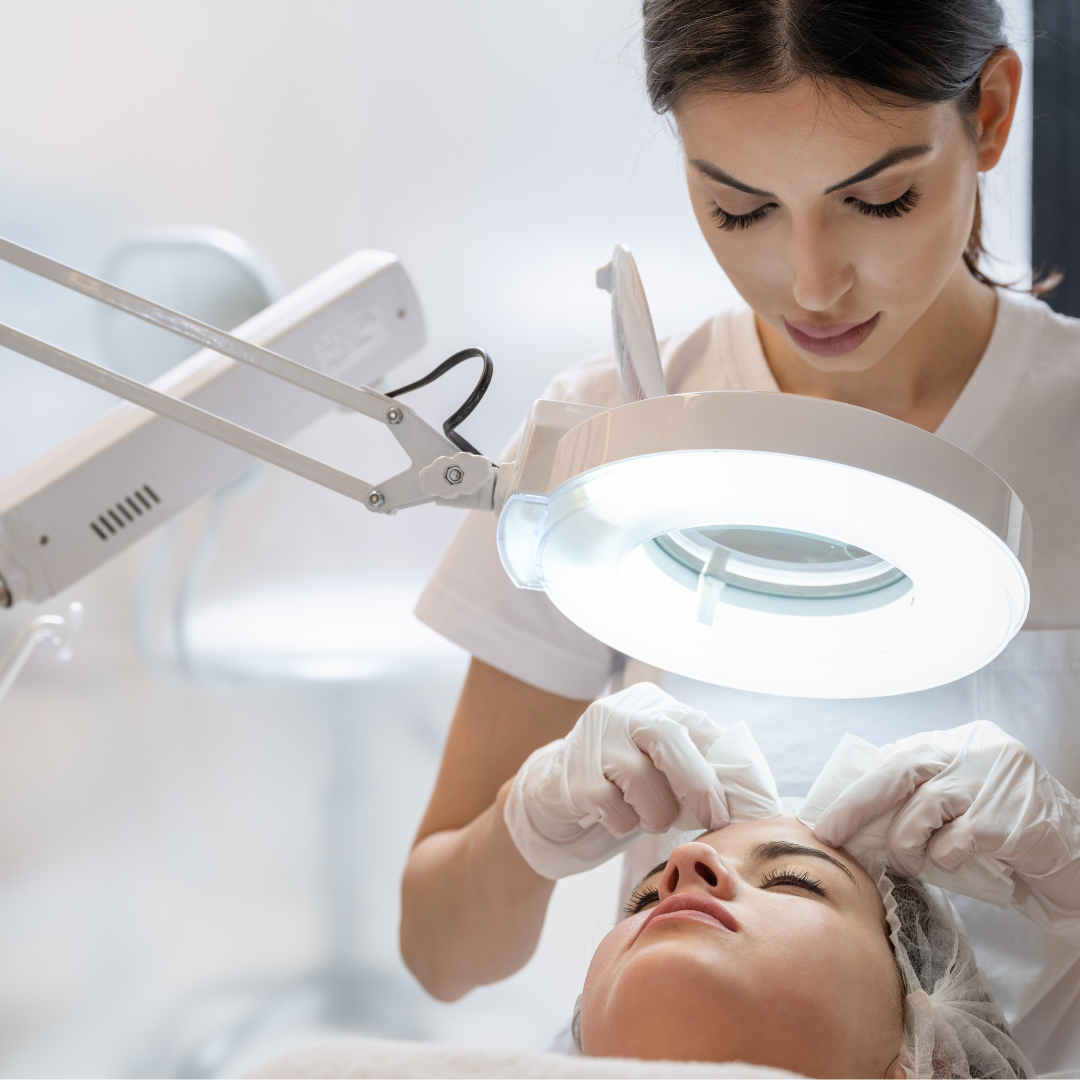-
Safety in Permanent Makeup
How to Ensure the Highest Hygiene Standards?
Hygiene in permanent makeup is the foundation of every professional treatment. It not only affects the comfort of the PMU artist but, most importantly, protects the health and safety of the client. Every stage of the procedure – from setting up the workspace to the treatment itself and post-session cleanup – requires strict adherence to safety protocols.
By following safe PMU practices and maintaining a hygienic PMU workstation, you minimize the risk of infections, allergic reactions, and build lasting trust in your PMU salon.
In this article, we’ve gathered the most important PMU hygiene principles to help you maintain the highest safety standards in your daily practice.

Key Hygiene Rules During Permanent Makeup Procedures
• Wash hands thoroughly – at least 20 seconds before and after each client, using antibacterial soap or disinfectant.
• Wear gloves, a face mask, and a protective apron – this protects both you and your client.
• Use single-use PMU accessories (ink cups, needles, cartridges), and protective barriers on equipment.
• Disinfect all surfaces regularly – including tables, lamps, chairs, and door handles – anything the client or artist may touch.
Everything at your workstation must be either disposable or sterile. This ensures you meet required standards and create a space where clients feel completely safe.

Disinfection and Sterilization of PMU Tools – How to Do It Properly?
Disinfection of PMU tools should always follow a multi-step process:
• PHASE 1: Pre-cleaning – remove pigment residue and debris using brushes and detergent.
• PHASE 2: Disinfection soak – place tools in an approved disinfectant suitable for skin-contact instruments.
• PHASE 3: Sterilization – ideally using an autoclave (the most recommended solution), or UV sterilization as a supplementary method.
All metal tools must be fully sterilized before each use. All disposable items should be opened in front of the client and discarded immediately after the session into a medical waste bin.
It’s also crucial to document your sterilization process and check your equipment regularly – this is a legal obligation in many countries and a mark of professional service.

How to Prepare a Safe PMU Workstation?
A hygienic PMU workstation is not just a clean desk – it’s a well-organized, logical setup that supports safe workflow:
• Use barrier protections: plastic wrap for cords, grip sleeves, and disposable mats.
• Clean and disinfect all surfaces before and after each procedure.
• Keep everything within arm’s reach – minimizing movement reduces the risk of contamination.
• Ensure proper ventilation and a neutral smell – fresh air improves comfort for both artist and client.
Your PMU setup is your calling card. Clients often judge the professionalism of your salon based on cleanliness alone.
Find must-have accessories

Disposable Accessories in PMU – Why Are They a Must?
Single-use PMU accessories are essential for infection control. Every professional PMU artist should stock and use:
• Cartridges – individually sealed, opened in front of the client, and discarded after use.
• Gloves – changed at least twice during the session: once after setup and once before pigmentation.
• Pigment cups, applicators, wipes – all single-use only.
Never reuse anything that has come into contact with skin or bodily fluids. Disposable tools are one of the most important safety measures in a PMU studio.
Get safe cartridges

How to Avoid Infections and Allergic Reactions in PMU?
Infections and allergies can result not only from poor hygiene but also from insufficient client screening. Here’s how to minimize risks:
• Health consultation – ask about allergies, autoimmune disorders, medications, and past pigment reactions. Always have the client fill out a health declaration.
• Skin preparation – disinfect the treatment area with a surgical-grade product and avoid touching it with non-sterile tools afterward.
• Pigment choice – use only certified, REACH-compliant pigments from trusted brands.
• Aftercare guidance – give your client clear instructions to avoid UV exposure, saunas, swimming, and active skincare ingredients like retinol or acids for at least 14 days.
Get PMU skincare

Summary
Hygiene standards for PMU artists are not just a formality – they are a crucial part of your service. By maintaining clean, sterile tools, using disposable accessories, and following strict safety procedures, you protect your client’s health, elevate your professional reputation, and offer peace of mind to everyone who walks through your salon door.
Frequently Asked Questions
-
Do all PMU accessories have to be single-use?
Not all of them, but most should be. Single-use PMU accessories include cartridges (commonly referred to as needles), pigment cups, gloves, and applicators. All of these should be opened in front of the client and discarded immediately after the procedure.
-
What’s the difference between disinfection and sterilization?
Disinfection removes most microorganisms from surfaces but does not eliminate all bacterial spores. Sterilization, such as using an autoclave, completely destroys all forms of microbial life and ensures the highest level of safety.
-
How do you prepare a hygienic PMU workstation?
Use protective films, single-use table covers, and certified disinfectants. Equipment and materials should be arranged ergonomically, and all surfaces must be disinfected before and after each procedure. This enhances both client safety and the comfort of the PMU artist.
-
Can a PMU procedure cause allergic reactions?
Yes, which is why conducting a detailed health screening prior to the treatment is essential. It’s also important to use pigments that have been tested for safety and skin compatibility.
-
Why is it forbidden to reuse PMU cartridges or needles?
Because these tools come into contact with blood and bodily fluids, reusing them poses a high risk of viral or bacterial infections. Cartridges and needles must always be disposed of after a single use.